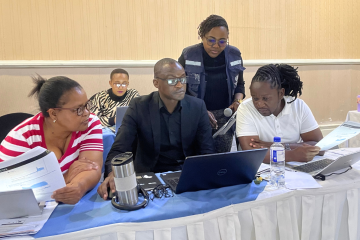By Vivian Mugarisi
Harare, Zimbabwe– The World Health Organization (WHO) donated cholera kits and medical supplies to the Ministry of Health and Child Care (MoHCC) in Zimbabwe as part of ongoing efforts to combat the cholera outbreak. The kits, procured with financial support from United States Centers for Disease Control and Prevention (USCDC) and WHO, include antibiotics, oral rehydration salts, intravenous fluids, and medical sundries such as gloves and syringes. Additionally, WHO handed over a 4X4 vehicle for use towards scaling up of mental health services in line with country priorities through the Special initiative on Mental Health. The vehicle was bought with financial support from the Norwegian Agency for Development Cooperation (NORAD).
The treatment kits which consist of 20 community, 6 peripheral and 2 central kits are estimated to serve approximately 2 800 patients. This intervention will go a long way in ensuring that the country has the necessary resources to provide prompt and effective treatment to cholera patients while enabling health workers to provide safe and effective care to patients.
After three years with no outbreak, Zimbabwe recorded a cholera outbreak on 12 February, and a cumulative of 1285 cases had been recorded by 21 May 2023. Twenty-six (26) districts are affected. The outbreak has been attributed to poor sanitation, inadequate access to safe drinking water, and a lack of hygiene practices.
MoHCC Permanent Secretary Dr Jasper Chimedza commended WHO for the rapid response noting that the supplies will amplify current response efforts and save lives.
“We have intensified response activities in all the affected districts and this donation is timely as the kits will help us respond to cholera from community and facility level and subsequently preventing deaths,” said Dr Chimedza.
The increase in cholera cases in districts that were previously non-cholera hotspots has created pressure on the health system of the country. In addition, most cases are being recorded in areas that had not been previously targeted for oral cholera vaccine while access to clean water and sanitation is also a challenge in these areas.
The WHO Country Representative for Zimbabwe Professor Jean-Marie Dangou said while efforts put in place to respond to cholera are commendable, provision of safe water and sanitation is critical to prevent and stop the transmission of cholera and other waterborne diseases.
“We would like to emphasize that addressing the primary causes and drivers of cholera remains critical and provides more sustainable solutions to occurrence of cholera,” he said.
In addition to the cholera supplies, WHO is working closely with the MoHCC and partners to improve overall cholera response activities through provision of critical training for health care workers, improve case management, data analysis, utilization on cholera guidelines as well as enhancing surveillance on the ground for early detection and response. Zimbabwe with support from WHO and other partners is currently implementing a Multi-Sectoral Cholera Elimination Plan which seeks to eradicate cholera by 2028.
Cholera is a highly infectious disease that is caused by the ingestion of food or water contaminated with the bacterium Vibrio cholerae. The disease is characterized by severe diarrhea and vomiting, which can lead to dehydration and death if left untreated.
Note: This article have been indexed to our site. We do not claim legitimacy, ownership or copyright of any of the content above. To see the article at original source Click Here













